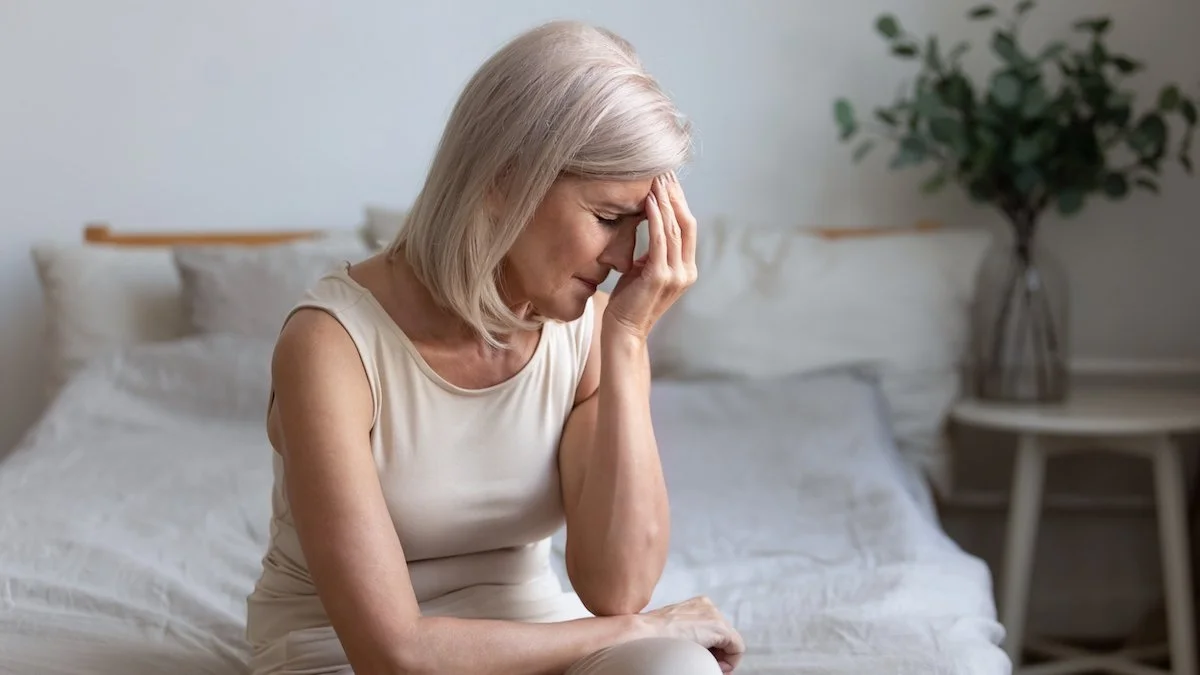Two Lesser Known Ways to Improve Sleep Post-Menopause
By: Kelly Murray, Certified Adult Sleep Coach, FDN-P
Have you started suffering with your sleep post-menopause? Rest assured, you are not alone in this journey.
Shockingly, studies reveal that an alarming 35% to 60% of women who have already experienced menopause face sleep challenges.
Frankly, I personally think this is an unacceptable situation. You've come too far to let sleep issues slow you down. That's why I'm here to share with you two invaluable tips for improving sleep after menopause.
Understanding the Root Causes
It goes without saying that the reason behind your current sleep issues is because you have stopped ovulating and your sex hormones, progesterone and estrogen have plummeted. This puts you at risk of conditions such as hot flashes, which definitely interrupt your sleep, as well as an increased risk of sleep apnea.
Additionally, mood changes like depression, as well as alterations in gut health and insulin resistance, can affect your sleep quality. It's important to shed light on these lesser-known aspects that often go unnoticed in discussions surrounding postmenopausal sleep.
Prioritizing Gut Health
Let's start by delving into one of my favorite topics, gut health, which plays a pivotal role in your overall well-being after menopause. Maintaining a healthy gut becomes particularly crucial if you're experiencing sleep issues. But first, let's define what we mean by "gut health."
The main thing when it comes to proper gut health is to make sure that you have a diverse and balanced microbiome. If you have never heard of that definition before, let me just give you a quick rundown as to what I'm talking about.
MICROBIOME
Our gut houses trillions of microorganisms, including bacteria, viruses, and even parasites and yeast. Astonishingly, we have more of these organisms in our bodies than cells. They fulfill essential functions, such as aiding in digestion, regulating our nervous system, producing mood and sleep-regulating neurotransmitters, and metabolizing hormones.
To promote a healthy gut microbiome, diversity is key. You want a variety of bacterial strains, both beneficial and harmful, with an emphasis on the dominance of beneficial bacteria. This balance is necessary to prevent the overgrowth of good bacteria and maintain a slightly activated immune system for optimal gut health. It's really important that the good bacteria outweigh the bad bacteria.
You do want some bad bacteria in your stomach, because it helps to prevent the bad bacteria from just overtaking your body. In addition, it helps your immune system to be slightly activated at all times.
Recent research has revealed a decline in gut microbiome diversity after menopause, which can contribute to poor sleep.
Let's explore the reasons behind this phenomenon in greater detail. Our gut is responsible for:
producing neurotransmitters like serotonin.
95% of our Serotonin is produced in our stomachs, and Serotonin is the happy hormone.
It helps prevent conditions such as depression—an established risk factor for insomnia.
Serotonin serves as a precursor to melatonin, the hormone that induces sleep or “the sleepy hormone.”
After menopause, declining serotonin and melatonin levels could be attributed to an unsupported gut microbiome.
2. breaking down and absorbing nutrients, including minerals crucial for quality sleep, like magnesium.
Magnesium is essential to get adequate sleep because it's the mineral that helps our brain and our bodies to relax.
Additionally, the gut's estrobolome, which produces the enzyme beta glucuronidase, supports healthy estrogen production by reactivating deactivated estrogen in the stomach.
If menopause negatively impacts the estrobolome, it leads to diminished recirculating estrogen, further exacerbating estrogen level decline.
3. post-menopause, the gut becomes more permeable, allowing undesired molecules to pass into the bloodstream.
This triggers an immune response, resulting in increased inflammation and elevated cortisol levels—the alert hormone that opposes sleep.
Promoting a Healthy Gut Microbiome
Now, let's explore effective ways to support a healthy gut microbiome and improve your sleep after menopause:
Incorporate fermented foods into your diet:
Foods like yogurt, kimchi, kombucha, and kefir contain live probiotics, which replenish beneficial bacteria in the gut.
Take a daily probiotic and prebiotic:
Ensuring a steady supply of good bacteria and providing them with the necessary prebiotics for growth is vital.
Eliminate processed foods and refined sugar:
Harmful bacteria and yeast thrive on these substances, hindering a healthy gut environment.
Consider a GI map test:
This comprehensive stool test analyzes the DNA of your gut microbiome, providing valuable insights into beneficial and harmful bacteria, as well as identifying potential issues like parasites and candida overgrowth.
Armed with this knowledge, you can pursue a targeted gut cleanse to eliminate harmful bacteria and promote the growth of beneficial ones.
Enhancing Insulin Sensitivity
After menopause, our bodies become more insulin resistant due to decreased estrogen levels. Understanding insulin resistance is essential to grasp the connection between blood sugar regulation and sleep.
If you haven't heard that term insulin resistance before, let me break down exactly what that means. After a meal, the glucose from our food is released into our blood. Bloodstream. It's the hormone insulin's job to help our cells absorb the glucose.
When glucose from food enters the bloodstream, insulin facilitates its absorption by cells. However, reduced estrogen levels make cells less responsive to insulin's requests. Additionally, a diet high in refined carbohydrates and sugars can exacerbate insulin resistance, as cells become less receptive to insulin's continuous signals.
That's because they are so sick of insulin asking them to absorb glucose. You can think of insulin as a nosy neighbor who's constantly knocking on your door, trying to get in your business. After some time, you're going to stop answering your door, right? That's what happens with the cells. The cells get sick and tired of insulin asking them to absorb glucose and they become more resistant.
This poses a problem because insulin resistance leads to erratic blood sugar spikes and subsequent crashes. The stress response triggered by these fluctuations results in increased cortisol production, which impedes sleep. Moreover, irregular blood sugar patterns persist during the night, further disrupting sleep.
Cortisol actually helps to increase your blood sugar. So the more spikes and dips you have during the day, the more taxing that is on your adrenals and it puts you susceptible to HPA axis dysfunction, which I talk about in another blog, linked here.
This can lead to higher levels of Cortisol, and we want to make sure that our Cortisol levels are nice and low at night so that we can sleep. If you're on the blood sugar roller coaster during the day, where your blood sugar is constantly spiking and dipping, that pattern repeats itself overnight. If your blood sugar goes too low overnight, that's going to trigger the production of Cortisol and wake you up. In addition, if it goes too high, that will wake you up as well.
Achieving Insulin Sensitivity
Here are some effective strategies to promote insulin sensitivity and stabilize blood sugar levels after menopause:
Prioritize balanced meals:
Consistently include protein, healthy fats, and complex carbohydrates in every meal to promote stable blood sugar levels. A complex carbohydrate is typically very low in sugar.
Think whole foods, vegetables, and non sugary fruits.
You need complex carbohydrates for a healthy metabolism as well as for brain health and for sleep.
Reduce refined carbohydrates and sugars:
Minimize your consumption of processed foods and opt for whole, unprocessed alternatives.
Don't think that you need to remove carbohydrates completely from your diet.
Just make sure you're focusing on carbohydrates that have a low glycemic index. That means they are less likely to spike your blood sugar.
If you pair those complex carbohydrates with fat and protein, that is going to help to slow the release of glucose into your cells.
Go for a 10 minute walk:
After a meal, go for a quick ten minute walk.
Your muscles need to use glucose in order to operate. So that's going to help to flatten your glucose curve.
Glucose Monitor:
I would recommend wearing a continuous glucose monitor for about a month. I actually recommend that all my clients wear one. That way we can see how their body is responding to different foods.
What a continuous glucose monitor? Is it's a sensor that you wear in your arm that measures your blood glucose monitor that measures your blood glucose levels on a 24 hours basis.
It can be really helpful to see if your blood sugar spikes after eating certain foods and certain combinations. That way you can focus on that way you know exactly what you need to eat to help balance your blood sugar.
Explore the connection with a healthcare professional:
Discuss HPA axis dysfunction and the impact of insulin resistance on sleep with a qualified healthcare provider.
By implementing these strategies, you can help restore insulin sensitivity, stabilize blood sugar levels, and pave the way for restful sleep after menopause.
I hope that these tips will help you to obtain your best sleep ever after menopause. Because, let's face it, women are like fine wine. We get better with age, right?! We don't want poor sleep to get in the way of us living our best lives.
Also I do want to acknowledge that I didn't discuss HRT in this post because I'm not a licensed practitioner. It's not because I'm against HRT. In fact, I am a big proponent of HRT, and I've seen it work wonders in my postmenopausal patients.
I just wanted to open your eyes to a couple of things that you could do outside of taking hormone replacement therapy to improve your sleep. With all that being said, in addition to working with a licensed practitioner to see if HRT is a good fit for you, I would highly recommend also working on your functional health, which is what I do as a sleep coach and functional diagnostic nutrition practitioner.
If you would like to learn more about working with me on your functional health so that you can get the sleep you need and deserve in order to feel and be your best, please schedule a free 30-minute discovery call with me here to learn more→
Sweet Dreams
Kelly Murray is a certified adult sleep coach and an award-winning pediatric sleep consultant based in Chicago offering sleep coaching services nationwide.







